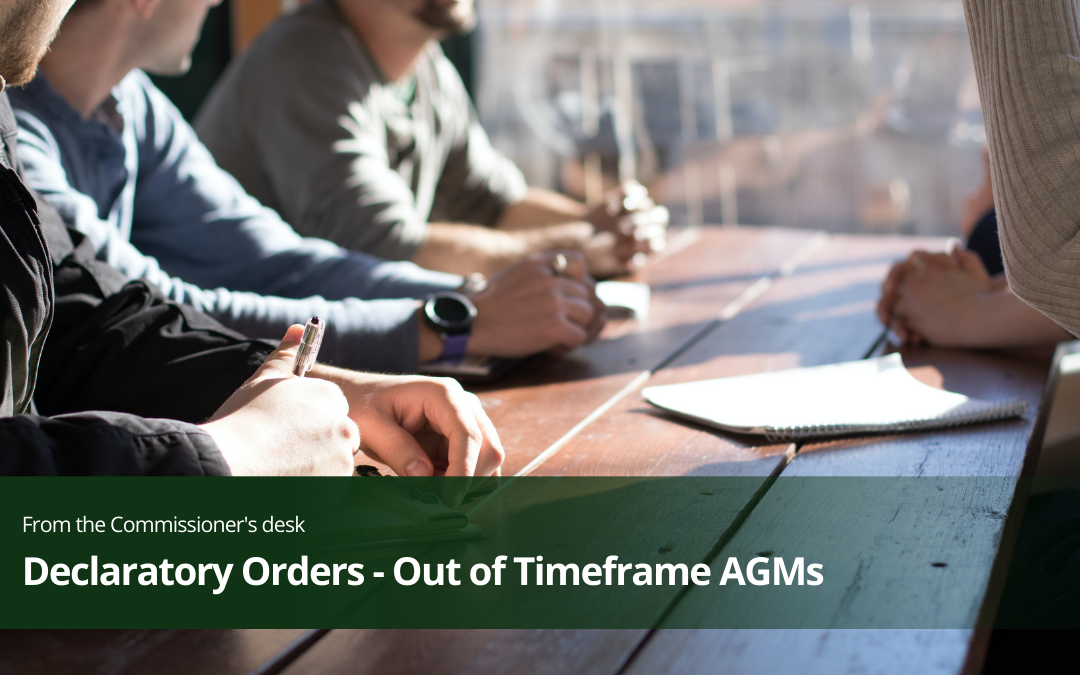The Body Corporate Commissioner explores the necessity of applying for a declaratory order if the AGM is scheduled to be held outside of the 3 month time frame.
An Annual General Meeting (AGM) must be held within 3 months of the end of a scheme’s financial year. For various reasons, bodies corporate are not always able to comply with that timeframe. When this happens, many apply for adjudication, seeking an order such as ‘permission to hold the AGM out of time’ or ‘an extension of time to hold the AGM’.
There is nothing in the Body Corporate and Community Management Act 1997 (the Act) or regulation modules to suggest that an adjudicator’s order is required or will assist when this happens. However, the Commissioner’s office received around 150-200 of these applications last financial year. This can consume the resources of the bodies corporate that lodge them, in the form of adjudication application fees and disbursements to body corporate managers, and the resources of the Commissioner’s office, as well as increasing waiting times on other matters.
These applications have no respondent and can only be made under section 227(2) of the Act. This section states that an application that seeks a declaratory order about the operation of the Act, by a person who is able to (under section 227(1)(a) to (h) of the Act) is also considered a dispute even if there is no respondent or affected person named in the application.
A declaratory order is simply a statement of the way the legislation works. It does not change the way it works. The body corporate’s legal rights and obligations remain the same after the order as they were before. The order simply clarifies matters for the benefit of the parties.
The declaration that is usually made in relation to late AGMs is that they will not be invalid due to their lateness. Review of adjudicators’ orders confirms that adjudicators do not give permission to hold the meeting late nor suggest that the body corporate is legally entitled to hold it late. They do not, and cannot, extend the three month timeframe. The adjudicator in Ciana [2021] QBCCMCmr 72 restated the legal reality that:
[7] …an AGM will not be invalid in its entirety merely because it is held late. There is nothing in the Act to suggest otherwise. If the meeting is otherwise held in accordance with statutory requirements and no one can demonstrate that they suffered any substantive prejudice due to the meeting’s lateness, there would be no basis for an adjudicator to find it void if faced with an application of that nature.
These declarations offer no legal protection for each individual body corporate that applies for them. This was specifically highlighted in Peninsula [2021] QBCCMCmr 131:
I note that this order does not preclude an application for the AGM to be declared invalid for some other reason not presently known to me, nor an application for an order requiring the AGM to be held sooner, if such applications were made.
And in Chancellor [2020] QBCCMCmr 501:
As of 1 October 2020, the body corporate will be in breach of [former] section 64 of the Accommodation Module. It should act promptly to bring the contravention to an end, notwithstanding that the validity of the meeting might not be at stake
Given that these declarations simply clarify and restate the legal reality, there is little need for them in most cases. There are hundreds of orders that already make it clear that an AGM is not invalid simply because it is held late. Nothing is gained by having an adjudicator say it again in each case.
The only situation where it might make sense to seek a declaration is if the body corporate is aware of some controversy about the validity of the AGM due to its lateness. In this situation the body corporate may prefer to seek a quick declaratory order to put the issue to rest
Anecdotally, that situation seems rare. We do not see many, if any, applications for an order that an AGM is void solely because it was held late. With some 50,000 community titles schemes in Queensland, that is unlikely to be due to the current practice of seeking declarations. There must be many AGMs held late across the State that are not the subject of a declaration, yet do not result in a challenge to the validity of the meeting.
This does not suggest that bodies corporate may hold their AGM whenever they like. They are required by legislation to hold it within three months of the end of their financial year and should continue to make all attempts to do so.
